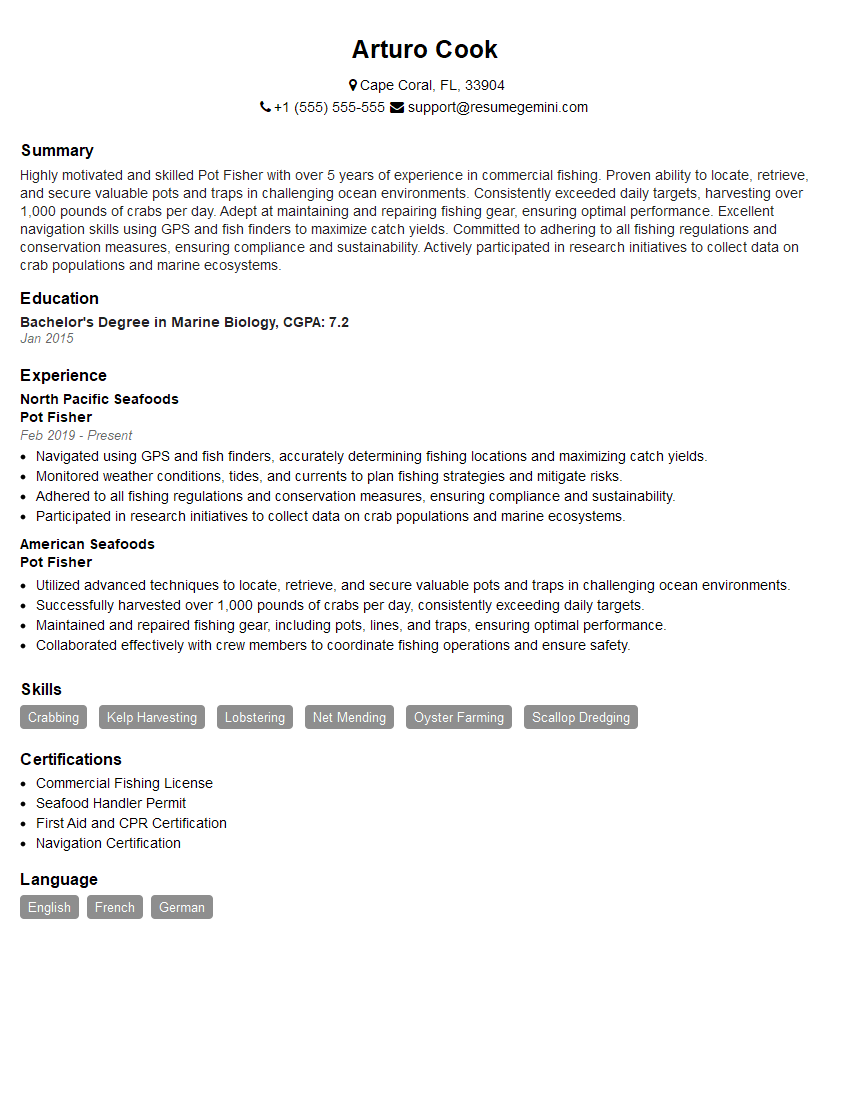Are you a seasoned Pot Fisher seeking a new career path? Discover our professionally built Pot Fisher Resume Template. This time-saving tool provides a solid foundation for your job search. Simply click “Edit Resume” to customize it with your unique experiences and achievements. Customize fonts and colors to match your personal style and increase your chances of landing your dream job. Explore more Resume Templates for additional options.

Arturo Cook
Pot Fisher
Summary
Highly motivated and skilled Pot Fisher with over 5 years of experience in commercial fishing. Proven ability to locate, retrieve, and secure valuable pots and traps in challenging ocean environments. Consistently exceeded daily targets, harvesting over 1,000 pounds of crabs per day. Adept at maintaining and repairing fishing gear, ensuring optimal performance. Excellent navigation skills using GPS and fish finders to maximize catch yields. Committed to adhering to all fishing regulations and conservation measures, ensuring compliance and sustainability. Actively participated in research initiatives to collect data on crab populations and marine ecosystems.
Education
Bachelor’s Degree in Marine Biology
January 2015
Skills
- Crabbing
- Kelp Harvesting
- Lobstering
- Net Mending
- Oyster Farming
- Scallop Dredging
Work Experience
Pot Fisher
- Navigated using GPS and fish finders, accurately determining fishing locations and maximizing catch yields.
- Monitored weather conditions, tides, and currents to plan fishing strategies and mitigate risks.
- Adhered to all fishing regulations and conservation measures, ensuring compliance and sustainability.
- Participated in research initiatives to collect data on crab populations and marine ecosystems.
Pot Fisher
- Utilized advanced techniques to locate, retrieve, and secure valuable pots and traps in challenging ocean environments.
- Successfully harvested over 1,000 pounds of crabs per day, consistently exceeding daily targets.
- Maintained and repaired fishing gear, including pots, lines, and traps, ensuring optimal performance.
- Collaborated effectively with crew members to coordinate fishing operations and ensure safety.
Certificates
- Commercial Fishing License
- Seafood Handler Permit
- First Aid and CPR Certification
- Navigation Certification
Languages
- English
- French
- German
Career Expert Tips:
- Select the ideal resume template to showcase your professional experience effectively.
- Master the art of resume writing to highlight your unique qualifications and achievements.
- Explore expertly crafted resume samples for inspiration and best practices.
- Build your best resume for free this new year with ResumeGemini. Enjoy exclusive discounts on ATS optimized resume templates.
How To Write Resume For Pot Fisher
- Highlight your experience in crabbing and other relevant fishing techniques.
- Emphasize your ability to work independently and as part of a team.
- Showcase your knowledge of fishing regulations and conservation practices.
- Quantify your accomplishments, such as the amount of crab harvested or the number of pots retrieved.
- Include relevant certifications or training in your resume.
Essential Experience Highlights for a Strong Pot Fisher Resume
- Utilized advanced techniques to locate, retrieve, and secure valuable pots and traps in challenging ocean environments.
- Successfully harvested over 1,000 pounds of crabs per day, consistently exceeding daily targets.
- Maintained and repaired fishing gear, including pots, lines, and traps, ensuring optimal performance.
- Collaborated effectively with crew members to coordinate fishing operations and ensure safety.
- Navigated using GPS and fish finders, accurately determining fishing locations and maximizing catch yields.
- Monitored weather conditions, tides, and currents to plan fishing strategies and mitigate risks.
- Adhered to all fishing regulations and conservation measures, ensuring compliance and sustainability.
Frequently Asked Questions (FAQ’s) For Pot Fisher
What are the primary responsibilities of a Pot Fisher?
The primary responsibilities of a Pot Fisher include locating, retrieving, and securing pots and traps in ocean environments, maintaining and repairing fishing gear, collaborating with crew members, navigating using GPS and fish finders, monitoring weather conditions, and adhering to fishing regulations.
What qualifications are required to become a Pot Fisher?
To become a Pot Fisher, a high school diploma or equivalent qualification is typically required. Additionally, experience in commercial fishing, knowledge of fishing techniques, and physical fitness are advantageous.
What are the career prospects for Pot Fishers?
Pot Fishers with experience and a proven track record can advance to supervisory or management positions within the fishing industry. They may also pursue opportunities in marine conservation or research.
What are the earnings prospects for Pot Fishers?
The earnings of Pot Fishers vary depending on factors such as experience, location, and the type of fishing operation. According to the U.S. Bureau of Labor Statistics, the median annual wage for Fishers and Related Fishing Workers was $30,190 in May 2021.
What are the working conditions for Pot Fishers?
Pot Fishers work in challenging and often hazardous ocean environments. They may encounter extreme weather conditions, physical hazards, and long hours. Physical fitness and endurance are essential for this role.
What is the job outlook for Pot Fishers?
The job outlook for Pot Fishers is expected to be competitive, with limited growth projected over the next decade. However, experienced and skilled Pot Fishers with a proven track record may have better job prospects.
What are the safety precautions that Pot Fishers should take?
Pot Fishers should wear appropriate safety gear, such as life jackets and non-slip footwear. They should also be aware of weather conditions and tides, and avoid fishing in hazardous areas. Regular maintenance and inspection of fishing gear is crucial to prevent accidents.
How can I become a more effective Pot Fisher?
To become a more effective Pot Fisher, consider obtaining additional training or certification in fishing techniques and navigation. Staying informed about industry best practices and regulations is also important. Building strong relationships with crew members and maintaining a positive attitude can contribute to overall success.